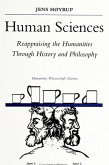The author has taken an important subject, one which has pervaded the thinking of scientists, philosophers, and historians, and with impeccable scholarship and great clarity has concerned himself with a specific aspect of it: the way in which the determination of how the unity of the sciences is to be conceived presented itself to philosophers as a specifically philosophical or logical problem. The study is not, therefore, an essay in the history of ideas showing the idea of unity at work in many cultural contexts, or in the history of the classification fo the sciences; nor does it discuss philosophers who suppose a unity but do not discuss it. Rather it is an exposition of what is directly said on the subject of unity by a number of philosphers who view it in their different ways as a problem for solving. Those chosen for discussion belong to the classical period of modern philosophy, the seventeenth and eighteenth centuries, and chapters take up the contributions of Bacon, Descartes, Leibniz, Condillac, Diderot and D'Alembert, and Kant. This will be an important book for students and teachers in the history of philosophy, of science, of ideas; and will also be useful to students of English and French literature in the period it covers.
Bitte wählen Sie Ihr Anliegen aus.
Rechnungen
Retourenschein anfordern
Bestellstatus
Storno





![A General View of Positivism: Summary exposition of the System of Thought and Life [From Discours Sur L'Ensemble Du Positivisme] A General View of Positivism: Summary exposition of the System of Thought and Life [From Discours Sur L'Ensemble Du Positivisme]](https://bilder.buecher.de/produkte/60/60656/60656168m.jpg)


